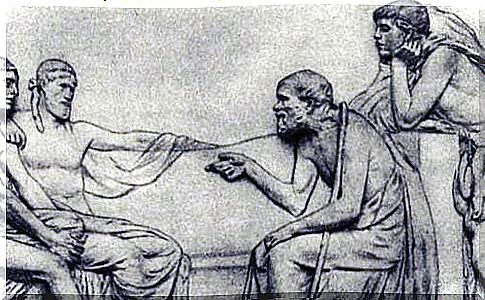What Are Socrates’ Three Filters?

Socrates’ three filters stem from an anecdote of the great Greek philosopher Socrates. Many consider this anecdote a great life lesson that can help us deal with gossip and rumors.
This story tells that one of Socrates’ disciples was quite annoyed one day. He told Socrates that he had met one of his friends and that this friend had spoken badly of him.
Socrates asked the man to calm down. After thinking for a while, he asked his student to wait. Before he was willing to listen to what he had to say, the message had to be subjected to its three filters. If the message couldn’t stand this, Socrates said the message wasn’t worth hearing.

Socrates’ three filters
As he always did, the Greek philosopher asked his excited student a question: “Are you sure what you’re about to tell me is true?” The student thought for a moment. In fact, he wasn’t quite sure if what he’d heard the friend say was really malicious.
It was a matter of perspective. “So you don’t know whether everything he said about me is true or not,” said the philosopher. The student had to admit that he did not know this.
Then Socrates asked him a second question: “Is what you are going to tell me a good thing or not?” The student said it was clearly not a good thing at all. In fact, it was the exact opposite.
He believed that what he intended to share with the philosopher would cause him discomfort and distress. Socrates said to him, “So, you want to tell me something bad that you’re not even sure is true.” The student then admitted that this was the case.
Then Socrates asked the third and final question, “Is what you have to say about my friend anything that will help me?” . The student hesitated for a moment. He didn’t know whether the information was really useful or not.
Maybe it would ruin the friendship between Socrates and his friend, but given that he wasn’t sure if it was true or not, it might not have been helpful at all.

Truth, goodness and usefulness
In the end, the philosopher refused to listen to what his student wanted to tell him. “If what you want to tell me isn’t true, isn’t good, and isn’t even helpful, why would I want to hear it?” he finally said to his student.
Truth, goodness, and utility are the basis of Socrates’ three filters. Socrates believed that a person should always ask themselves the following questions before deciding to spread the word : “Am I sure what I’m about to say is true?” “Is what I’m about to say a good thing?” and “Does it really need to be said and is it helpful?”
These three filters from Socrates can be an excellent guide, both in deciding whether or not to pass on something and in deciding whether or not to listen to something. These are therefore a few useful guidelines that promote healthy and constructive communication.

How to apply these three filters in practice
In everyday life it is not always easy to define the true, the good and the necessary. These are abstract concepts that are sometimes difficult to apply. You can therefore also ask yourself some additional questions, which will help you apply the three filters of Socrates:
- As to the truth of it, am I 100% sure this information is true? Would I dare to bet on it? Can I prove it to someone? Am I willing to risk my reputation with it?
- As to its goodness, does it benefit me or the other person? Will it make me or the other person a better person and evoke positive emotions? Will it improve the situation of those involved?
- As to its necessity or usefulness, will sharing this message improve this person’s life or my life? Will the other person be able to take concrete action based on this information or message? In what way does not being aware of this information hurt or affect the other person?
As we mentioned at the beginning of this article, Socrates’ three filters are mainly aimed at rumors or gossip. By applying them, we can avoid annoying gossip that can haunt us. However, you can also apply them to other messages, such as the messages we see on social media.









